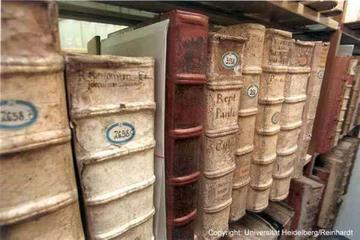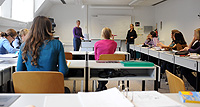Romance Studies: French

Course outline
Course structure
Main research interests
Formal requirements
Fachstudienberatung
Kontakt
| Degree | Bachelor of Arts |
| Application | mandatory |
| Course commences | winter semester only |
| Standard course duration | 6 semesters |
| Focus options | 50% (with Teaching Degree option); 25% |
| Language requirements | 50%: basic knowledge of Latin |
| Language of instruction | German and French; examinations held in French |
Note for prospective students interested in coming to Heidelberg University to take the Teaching Degree course qualifying its graduates to teach at higher secondary (grammar) schools (Gymnasien) in Germany:
In accordance with the statutory provisions laid down by the State of Baden-Württemberg, students wishing to embark as of winter semester 2015/2016 on a Teaching Degree qualifying them to teach at higher secondary (grammar) schools (Gymnasien) in Germany can only do so by enrolling in two-tier courses with a Bachelor/Master structure (polyvalent two-subject (50%) Bachelor programme with a Teaching Degree option; Master of Education course scheduled to start in winter semester 2018/2019).
As of winter semester 2015/2016, the subject described on this page can be studied in a polyvalent two-subject (50%) Bachelor course with a Teaching Degree option. It has to be combined with another 50% subject of relevance for secondary-school education.
For more information, go to https://www.uni-heidelberg.de/studium/zlb/
Note for students already enrolled in a Teaching Degree course in the framework of the Examination Regulations for Teachers at Higher Secondary Schools (GymPO I):
In the winter semester 2015/2016 and later, students enrolled by 31 July 2015 in a Teaching Degree course regulated by the provisions of GymPO I (2009) are entitled to switch to a different main subject under the conditions set out in said GymPO provided that the change is in accordance with the statutory provisions.
In this case, the following transitional regulations apply: http://www.uni-heidelberg.de/md/studium/zlb/beratung/150515_gympo-uebergangsregelungen_final.pdf
For more information, go to https://www.uni-heidelberg.de/studium/zlb/
Course outline
Literary studies
French literary studies consider not only French and Francophone literature, but also theatre and film. Students thus deal with both texts and images. Texts of all genres from various periods; from the Middle Ages to the twenty-first century, along with theatre productions and film adaptations of literary works, are considered.
There is a particular focus on the following areas:
- Literature and cultural history
- Literary theory and poetics
- Literary genres (i.e. the three major genres; the epic, drama and lyric)
Linguistics
Topics/areas dealt with in French linguistics include the following:
- the transition from Latin to a Romance language and the development of French
- history and spread of the French language
- French language contact and French in Francophone countries
- analysis of the French language system (morphology, lexic, grammar, phonetics/phonology)
- language and society, language variation and varieties of French
- contemporary French
- media and discourse analysis
- language standardisation, language policy and language criticism
- linguistic theories and methods
Cultural studies
- analysis of cultural phenomena in the French-speaking world; from artistic expression (e.g. film) to popular culture (e.g. fashion), both in the past and in the present day
- analysis of public discourses and their presentation in the media
- analysis of the relationships between culture and power (e.g cultural inheritance, mass media)
- theories and methods of cultural analysis (e.g. performance, construction of space) and comparative cultural analysis (e.g. intercultural and transcultural approaches)
- interdisciplinary and transdisciplinary approaches
- postcolonial theories
Language practice
Courses for French language practice are designed to enable students to:
- speak and write correctly and fluently
- understand complex contemporary texts (novels, newspapers, academic texts etc.), films, radio and television programmes, song lyrics etc.
- reflect on and discuss, both orally and in written form, aspects of French society, literary works and linguistic phenomena
- master and make accurate and differentiated use of grammatical structures, in particular in the area of French syntax
- recognise and distinguish between different registers (formal, informal, official French)
- translate texts of all types into French (i.e. literary, academic, journalistic texts)
Specialised Didactics
Didactics of modern foreign languages currently focusses on the approach taken to improving language skills. Skills are observed, and the features noted then inform steps taken for the targeted improvement of these skills. Following a given period aimed at improving language skills, these are reevaluated and conclusions are subsequently drawn as to how language skills can be efficiently further improved. This process is fully transparent and is carried out with the agreement of learners.
Central to this approach is the improvement of learners’ transversal skills. These build on other basic skills; intercultural skills and text and media analysis skills for example (critical analysis of texts, images etc. in their respective contexts).
Didactics widely refers to the determination of teaching aims, other issues, however, are also addressed. These include the
- improvement of functional communication skills (speaking, writing, listening, reading, speech projection) and the relevant linguistic means;
- the didactic adaptation of literary, cultural and linguistic content to topics taught in skill-orientated courses;
- promoting the development of individual learners;
- differentiating between heterogeneous groups of learners;
supporting learners throughout learning and construction processes
Course structure
Pleas see the Module handbook for the B.A. course.
Main research interests
The main research interests in linguistics are:
- the emergence of linguistic territories in the Latin/Romance area as a whole; history of Spanish, Catalan, Portuguese and Galician on the Iberian Peninsula and overseas, notably in America; history of everyday Italian; synchronic and diachronic investigations on syntax, semantics and word formation in the Romance languages
- varieties of present-day French and of Italian from the 18th century to the present; spoken and written language
- dialectology and sociolinguistics of southern Italy, language geography, notably geolinguistic investigations on the Campagna region; substandard research in conjunction with the eponymous Graduate College
- dictionary projects focusing on Old French, Old Spanish, Old Gascon, Old Occitan
Literary studies are anthropological, poetological and comparative in their approach. Main research interests (in connection with the literary history of all major Romance languages) are:
- Spanish and French literary studies; early modern age to late 17th century and high modernity in the 19th and 20th centuries; general issues in the theory of literature (deconstruction and hermeneutics)
- French and Italian literature from the 18th to the 20th century; literary anthropology with special reference to autobiographical writing in the early modern age; enlightenment in Italy (in conjunction with the Università di Torino); the novella in the 19th and 20th centuries; modern poetry; research on Stendhal (in conjunction with the University of Paris III)
Romance literature outside Europe; Spanish and French literature from Latin America and the Caribbean (with a special focus on cultural studies); literature of the Hispanics/Latinos in the USA
Formal requirements
Access to the B.A. course
As of the winter semester 2015/2016 a selection procedure will be used for admission purposes. In this selection procedure (referred to as an admission test in the Admission Regulations) applicants are awarded points in line with the following criteria:
- Achievements in subjects relevant for the B.A. course as listed in the school-leaving certificate (Abitur or equivalent university entrance qualifications) – max. 45 points; for a list of relevant achievements and details on the underlying calculations, see § 7 of the Admission Regulations
- Professional education/training or professional activity in a field relevant for the B.A. course and/or other non-school qualifications relevant for the B.A. course – max. 15 points; for a list of relevant qualifications and details on the underlying calculations, see § 8 of the Admission Regulations)
The maximum number of points achievable here is 60. All applicants who have achieved at least 35 points will be admitted to the course.
Applicants who have achieved between 25 and 34 points are required to participate in a selection interview. Please refer to the german version for a roundup on dates and provisions of those interviews.
Applicants participating in the selection for the first time and failing to achieve the requisite number of points can take part in the procedure one more time.
IMPORTANT: You must apply for admission to the selection procedure by 15 July latest. The admission procedure takes place once a year only (for the winter semester).
For more information, click here.
Online application for the course.
International applicants
There are special regulations for international applicants. For more information, apply to the International Relations Office of Heidelberg University (Seminarstraße 2).
Subject combinations
Possible subject combinations are listed in the Catalogue of Subjects. Combinations of two Romance Studies subjects are possible.
Study and examination regulations
Examination regulations B.A. (26 March 2015)
Examination regulations B.A. (14 June 2010)
Examination regulations B.A. (8 January 2009)
Examination regulations B.A. (only valid up to winter semester 08/09)
Students enrolled before 1 March 2009 can apply for the last-named regulations to be declared valid in their case. This is limited to a period of three years.
Module Handbook
Please click here to find the latest Module Handbook.
Module descriptions 33% option: see pp. 26-32 of the examination rules and regulations.
Fees
Tuition fees at Heidelberg University are payable at the beginning of each semester.
M.A. course
Heidelberg University offers a consecutive M.A. course in 'Études transculturelles. Littératures et contacts linguistiques dans l’espace francophone'.
Academic advisor
Catherine Péant-Abrahams
Department of Romance Studies, Office 321
Tuessdays 3 – 4 pm
phone: +49 (0)6221 542765
e-mail: catherine.peant-abrahams@rose.uni-heidelberg.de
Please note: Students/applicants requiring counselling will need to enter their names in the lists put up outside the relevant offices for this purpose.
Contact
Department of Romance Studies
Seminarstraße 3
D-69117 Heidelberg
Secretaries
Office 103
phone: +49 (0)6221 542731
fax: +49 (0)6221 543153
e-mail: Alessandra.Acquarone@urz.uni-heidelberg.de
Internet: http://www.uni-heidelberg.de/rose/
Location
Student representation
e-mail: rosig@urz.uni-heidelberg.de

